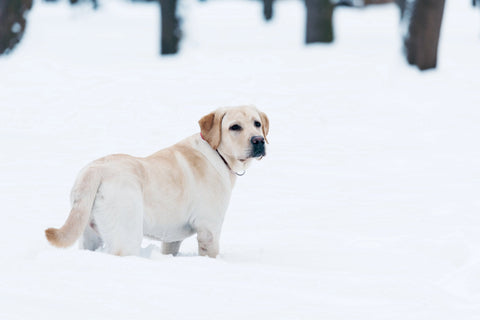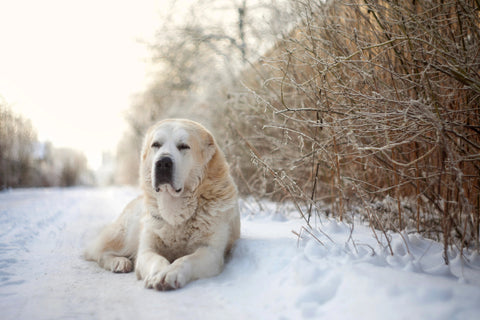Dogs chew - it's their innate nature. But sometimes they chew on inappropriate things like our carpets at home, rugs, furniture, personal belongings (shoes, slippers) and even electric wires, which can be very dangerous and stressful all the same. To avoid this series of unfortunate chewing, we come into the picture.

The variety of dog chews the market offers is overwhelming. What works for other dogs won't necessarily mean it will work for your furbaby, as all dogs have different types of chew personality. But one thing is definitely sure: there are chews that are actually bad and are definitely best avoided by all dogs & pet parents. Note: We're not saying that these chews will always cause problems in every dog, but dogs may have a problem with these.
In this article, we've come up with a list of the fairly popular and common dog chews to avoid and what their risks & dangers are.
Dog chews best avoided
Rawhides. Probably one of the most popular and debatable chews in the market, rawhides are made from the leather industry’s leftovers of inner hides of horses and cows that were thoroughly cleaned and cut during manufacturing. These hides are then placed into high levels of salt brines that slow down decay and are pressed into edible dog treats with varying shapes and sizes. Some of these rawhides are added with chicken, beef, or liver flavorings to make them more enticing to dogs.
Rawhides are controversial dog chews since they're treated with harmful chemicals and are not easily digested by your furbaby in case of ingestion. It can last for so many months in your dog's stomach, causing GI tract problems.
Bully sticks. One of the most popular dog chews, bully sticks are made up of dried steer or bull penis (yep, penis) but it's actually considered as an animal by-product so there's nothing to worry about that. Though it offers a variety of health benefits and lasts long, it's best to avoid it. Why? Because aside from being costly, it smells awful, too! The contamination of bacteria is also a cause of concern.

Bones. Giving bones of pigs, cow, chicken, or beef to dogs are very popular among pet parents. This comes from the idea that dogs in the wild are fond of chewing or eating bones for added calcium in their body. Yes, it's true but this does not apply to your domesticated furbaby since your dog is fed with a balanced diet that is able to fill in his nutritional needs.
Bones also splinter so easily and are also hard enough to break your dog's teeth. Splinters can be ingested and can either pierce or swell the gastrointestinal tract.
Nylon chew toys. Inedible chew toys are also a hit for pet parents but these things need to be avoided. Nylon chew toys are made out of very hard plastic and very hard nylon. As a result, it being too hard for your dog's teeth, nylon chew toys increases the risks of tooth fractures. Want to hear more bad news? If your dog is an aggressive chewer and is able to rip off some pieces of plastic or nylon and swallows them, it can lead to obstruction of the digestive tract.
Cheese blocks and cheese bones. Once puppies have been weaned they'll generate less lactase and this is when they become lactose-intolerant. But consuming dairy products (like cheese) doesn't pose too many issues in dogs. However, if the cheese is turned rock-hard as a bone or as a block, it can certainly cause more harm than good.
Cheese blocks and cheese bones are too hard for your dog's daily chewing activities. To make it worse, these dog chews are manufactured too small that it can wholly fit even in a little dog's mouth. When swallowed, it can cause choking and obstruction.
Cow hooves. Cow hooves are a bit hard to find these days but some pet stores still offer them. These are actually the toenails of a cow and is made up of keratin (just like our fingernails and hair). Like the others mentioned before this, cow hooves also posses equal danger of breaking your furbaby's teeth, splintering, and causing injuries to the digestive tract.
How to 'chews' the best dog chews
The dog chews mentioned above are the most common and fairly popular dog chews pet parents give to their furbabies. We know you want your pet to be safe and with the array of chews being launched in the market, you're in a constant search of dog chews with features that are likely to be safe for your furbaby. Here are a few things we recommend when looking:
Hardness. The hardness of a dog chew is one of the top things you should consider. It should be hard enough not to break and splinter but not too hard that it will break your dog's teeth.
To check if the hardness of a dog chew is appropriate, try the thumbnail press test. If you are able to make an impression on the surface of the chews, then it's probably too hard.
"One of the most popular dog chews, bully sticks are made up of dried steer or bull penis (yep, penis) but it's actually considered as an animal by-product"
Shape and size. A safe dog chew should be the right size - not too small that it can completely fit inside your furbaby's mouth. This can pose choking risks. It also shouldn't be too big that your dog's mouth could get injured or strain. The shape and size of a dog chew greatly depend on your dog's size.
Washability. As much as possible or if you opt to, choose a dog chew that is washable so you're able to clean and disinfect it from time to time.
High-quality and cost-effective. An ideal dog chew should last for a long time and be able to give your dog longer gnawing experiences. And since it lasts for weeks to months, you save money from purchasing chews almost every week.
Ingredients. A safe dog chew should not contain treated or coated flavorings, fragrance, or harmful dyes as these causes GI upset and supports the growth of bacteria and contamination.
How Pet Parents® can help?
Pet Parents® offers premium, grade A antler chews from elk and deers called Gnawtlers®. These are naturally-shed elk antler chews that will keep your dog healthy and entertained at the same time. Our antler dog chews have no artificial ingredients added that can cause any possible hazards to your pet, and it also has all the features mentioned above that qualifies it to be a safe dog chew.
Gnawtlers® also ensures natural dog bones & perfect bone marrow dog treats for your furbaby. The marrow inside of our antler chews is packed with calcium, phosphorus, manganese, and zinc, providing a delicious treat that strengthens your pup without all the calories & digestive issues
At Pet Parents® we take your pup's chew personality and size into account. Check out our website to find what Antler Dog Chew is the best for your pup.
A lot of dog chews are available in the market, but not all are created equal and safe. But Gnawtlers® can make you feel good about giving your dog our antler dog chews because they are safe, delicious, and nutritious.









